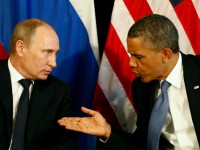
Yu Sui, Professor, China Center for Contemporary World Studies
Nov 03, 2015
The war against terrorists in Syria should not become a battlefield between the United States and Russia. If the United States and Russia choose confrontation, neither side will win, only wreaking havoc for the rest for the rest of the world.
David Shambaugh, Gaston Sigur Professor and Director of China Policy Program at George Washington University, Distinguished Visiting Fellow at Hoover Institution of Stanford University
Mar 27, 2015
President Xi Jinping will visit Washington D.C. in September, providing an essential opportunity for the two leaders to openly discuss bilateral relations, investment, and global issues. David Shambaugh calls on Chinese leaders to engage in action over slogans, and for each side to share their perceptions of the strategic intentions of the other; false perceptions must be discussed and refuted in order to reinvigorate mutual trust.
Franz-Stefan Gady, Associate Editor, Diplomat
Mar 25, 2015
China’s controversial new anti-terrorism law would require foreign companies to install “backdoors” to give authorities remote access to computers and networks, and has been placed under review due to Western concerns. Since China still has to rely on foreign technology in the immediate future, the law might have been used to tell the United States government not to engage in what Beijing called “reckless behavior,” or to further expose U.S. hypocrisy in its own cyber espionage practices.
Fu Xiaoqiang, Vice President, China Institutes of Contemporary International Relations
Mar 25, 2015
China’s new anti-terror laws are in response to changing transnational terrorist networks and are intended to designate agencies responsible for anti-terror activities while defining the obligations of the state, society, enterprises, and individual citizens. U.S. IT companies are concerned that increased security and oversight will affect business operations, but Fu Xiaoqiang reminds that this is not unseen in U.S. law either.
Ben Reynolds, Writer and Foreign Policy Analyst in New York
Mar 19, 2015
U.S. companies and leaders have criticized China’s new counter-terrorism law for its increased surveillance mechanisms. Yet, the U.S. government cannot claim the moral high ground when it blatantly violates the rights enshrined in its own constitution. A serious challenge to state surveillance will not come from other states; it must arise from China’s own citizenry.
Jin Liangxiang, Senior Research Fellow, Shanghai Institute of Int'l Studies
Mar 13, 2015
The Arab Spring was neither a transformation from authoritative political system to western democracy, nor a religious “Islamic Awakening.” Dr. Jin Liangxiang describes it as the reconstruction of political legitimacy, and primarily caused due to governments losing their legitimacy by not providing economically for the people. Externally imposed political systems will not solve the ongoing issues, though.
He Wenping, Senior Research Fellow, Charhar Institute and West Asia and Africa Studies Institute of the China Academy of Social Sciences
Feb 26, 2015
In order to defeat IS, action needs to be taken well beyond Iraq and Syria. The entire campaign will not be measured in months. It needs to be a global, multi-pronged and long-term battle and requires global input and cooperation to extirpate this universal scourge.
Wu Sike, Member on Foreign Affairs Committee, CPPCC
Feb 09, 2015
Following the attack on Charlie Hebdo, many westerners have rallied around the ideals of free speech. However, as Wu Sike shares, the new tendencies and changes in global terrorism determine that no country is immune to its effects, and that the global society must be more mutually respectful and communicative.
Wu Sike, Member on Foreign Affairs Committee, CPPCC
Feb 09, 2015
Following the attack on Charlie Hebdo, many westerners have rallied around the ideals of free speech. However, as Wu Sike shares, the new tendencies and changes in global terrorism determine that no country is immune to its effects, and that the global society must be more mutually respectful and communicative.
Shen Dingli, Professor, Institute of International Studies, Fudan University
Feb 02, 2015
The international response to the recent Charlie Hebdo incident indicates that there are subtle differences between the U.S. and Europe in their ideological treatment of free speech regarding religion. Shen Dingli suggests the difference between responsible free speech, and abstract instigation of other cultures.
Back to Top

- China-US Focus builds trust and understanding between the U.S. and China through open dialogue among thought leaders.
- Our Offerings
- Topics
- Videos
- Podcasts
- Columnists
- Research Reports
- Focus Digest
- Stay Connected
-
Thanks for signing up!
- Get the latest stories from China-US Focus weekly.